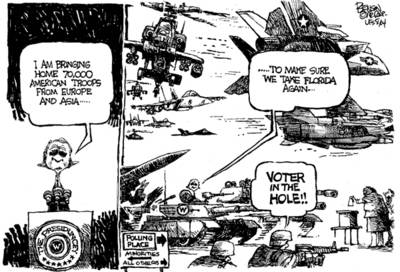CIA Sr. Intelligence Officer Speaks Out
By Julian Borger, The Guardian
Friday 20 August 2004
The CIA has taken much of the blame for the security lapses that led to 9/11 and the false intelligence on Iraq's WMDs. But now one spy has broken ranks to point the finger at the politicians - and warn that the war on terror could plunge the US into even greater danger.
These are not happy times at the CIA. In the space of a few short months, two official reports have found the agency principally to blame for failing to prevent the September 11 al-Qaida attack and for claiming that Iraq had weapons of mass destruction. There is no doubt there is a lot of blame to go round. The twin fiascos rank as the worst intelligence failures since the second world war. But the two reports, by the September 11 Commission and the Senate Intelligence Committee respectively, were also testaments to political expedience. Both panels were made up of Republican and Democratic loyalists who reached a political compromise by going relatively easy on both Clinton and Bush administrations, and focused on institutional culprits. The CIA, without a defender after the resignation in July of its long-serving director, George Tenet, presented the easiest target.
Yet most of the agency's rank and file believe they have done little wrong. They were the first to raise the alarm over the danger posed by Osama bin Laden, long before the 1998 embassy bombings in East Africa. In 1996 they set up a unit called the Bin Laden Issue Station, codenamed "Alex", dedicated to tracking him down, only to have one operation after another aborted as too politically dangerous.
There are a lot of angry spies at Langley, and one of the angriest is Mike Scheuer, a senior intelligence officer who led the Bin Laden station for four years. While some of his colleagues have vented their frustrations through leaks, Scheuer has done what no serving American intelligence official has ever done - published a book-length attack on the establishment. His book, Imperial Hubris: Why the West is Losing the War on Terror, is a fire-breathing denunciation of US counter-terrorism policy. In it, Scheuer addresses the missed opportunities of the Clinton era, but he reserves his most withering attack for the Bush administration's war in Iraq.
He describes the invasion as "an avaricious, premeditated, unprovoked war against a foe who posed no immediate threat but whose defeat did offer economic advantage". He even goes so far as to call on America's generals to resign rather than execute orders that "they know [...] will produce more, not less, danger to their nation". Bin Laden, he believes, is not a lonely maverick, but draws support from much of the Islamic world, which resents the US not for what it is, but for what it does - supporting Israel almost uncritically, propping up corrupt regimes in the Arab world, garrisoning troops on the Saudi peninsula near Islam's most holy sites to safeguard access to cheap oil.
"America ought to do what's in America's interests, and those interests are not served by being dependent on oil in the Middle East and by giving an open hand to the Israelis," Scheuer argues. "If we're less open-handed to Israel over time we can cut down Bin Laden's ability to grow. Right now he has unlimited potential for growing." What makes these comments the more challenging to the Bush administration is that they come from a self-described conservative and instinctive Republican voter.
It seems extraordinary that Scheuer's bosses allowed him to publish his book at all. They had already permitted him one book, Through Our Enemies' Eyes, written anonymously, but that was a more analytical work on Bin Laden and al-Qaida. Imperial Hubris is altogether different: a bitter polemic against orthodoxy and the powers that be.
Scheuer was given the green light only on condition that he stuck to a set of ground rules: he would continue to write as Anonymous, he would not reveal his job or employer, and he would refer only to information that is already "open source" - ie in the public domain. Inevitably, however, given the controversy surrounding the book, his identity has been leaked (first by a liberal weekly, the Boston Phoenix, then this week by the New York Times). Even now, he sticks closely to his employers' guidelines, refusing formally to confirm his identity, while describing his employers vaguely as "the intelligence community". (It is for this reason that he is not permitted by the CIA to be photographed except in silhouette.) Having initially been allowed to give media interviews to promote his book, Scheuer was told earlier this month that he has to ask permission for every interview and to submit an outline of what he is going to say. So far, no interviews have been granted under the new guidelines.
His interview with the Guardian is one of Scheuer's last before being gagged. Burly, bearded and in jeans and a loose shirt, his forceful vocabulary is a far cry from the cautious obfuscation that is the native tongue in Washington. Not that he minds rocking the boat a little. "If getting in somebody's face [helps] prevent the death of 3,000 Americans in New York or the sinking of the Cole in Yemen, or two embassies in East Africa, then I'm in your face," he says.
His bosses at the CIA have not confronted him over the book, other than to tell him what he can or cannot do with the press. "I don't think they get it yet. I still think there's a large group in the American intelligence community who talk about the next big attack but really believe 9/11 was a one-off," he says. "I think they believe their own rhetoric that they've killed two-thirds of the al-Qaida leadership, when they killed two-thirds of what they knew of."
Scheuer says that nearly three years after the September 11 attacks the US intelligence team dedicated to tracking down Bin Laden is still less than 30 strong - the size it was when he left in 1999. The CIA claims that the Bin Laden team is hundreds strong, but Scheuer is insistent that the apparent expansion is skin-deep. "The numbers are big, but it's a shell game. It's people they move in for four or five months at a time and then bring in a new bunch. But the hard core of expertise, of experience, of savvy really hasn't expanded at all since 9/11."
The morass in Iraq, meanwhile, is a "big factor in not allowing us to develop much expertise" on Bin Laden. "I think [director of central intelligence George Tenet] said we had enough people to do two wars at once, and clearly that was a fantasy."
The conclusion of the September 11 Commission - that the al-Qaida plot might have been broken up if the intelligence agencies had cooperated better and shared more information - was accompanied by recommendations for the creation of a national counter-terrorist centre and a national director of intelligence to coordinate the CIA, FBI and other agencies. Scheuer believes this is a classic bureaucratic fix. "I've never known a dysfunctional bureaucracy made better by being made bigger." His answer to the al-Qaida threat, unsurprisingly, is to give his old unit at the CIA, the Bin Laden station, more resources and more firepower.
It is a solution forged by the accumulated bitterness of missed opportunities. In one year under his watch, from May 1998 to May 1999, Scheuer reckons the US had up to a dozen serious chances to kill or capture Bin Laden. Only one was taken - a missile attack on an Afghan training camp in August 1998 - but either the al-Qaida leader was not there, or he had left before the missiles landed.
Months earlier, however, Scheuer believes there was a far better opportunity to grab Bin Laden. The CIA had made a deal with a group of Afghan tribesmen to raid Bin Laden's headquarters near Kandahar and then take him to a desert landing strip, where a US plane would take him either to America or another country for trial. The plan, rehearsed several times over many months, was in Scheuer's view "almost a perfect operation in the sense that there was no US hand visible". But on May 29 1998, according to the narrative in the September 11 Commission's report, Scheuer was informed that the operation had been cancelled because of the risk of civilian casualties.
The pattern was repeated on December 20 the same year, when Scheuer's agents were virtually certain that Bin Laden would be staying the night at a guest house in the Kandahar governor's compound. President Clinton's principal national security advisers once more decided that the danger of collateral damage was too high. Afterwards Scheuer wrote to the top CIA agent in the region, Gary Schroen, saying that he had been unable to sleep after this decision. "I'm sure we'll regret not acting last night," he predicted. Yet another opportunity, in Afghanistan, was missed in 1999.
Other intelligence veterans are more sympathetic to the policymakers' dilemma, pointing out that if the US had shot and missed Bin Laden, while killing others, the country would have been condemned around the world, potentially winning more recruits for al-Qaida. "Mike's is the viewpoint of the soldier versus the viewpoint of a general," argues Vincent Cannistraro, a former chief of operations at the CIA's Counter-Terrorist Centre. "There are political judgments made at a higher pay grade. I've been at both sides of that equation and they are difficult judgments to make."
Scheuer counters that the policymakers are just not asking the right questions. "The question is always what happens if we do this and we fail. The question is never what happens to Americans if we don't try this," he says. "When I took my oath of office, it was to preserve and protect and defend the constitution of the US. It wasn't 'to preserve and protect and defend as long as you don't kill an Arab prince, as long as you don't offend the Europeans, as long as you don't hit a mosque with shrapnel'." Scheuer's constant complaints eventually got him removed from his position at the head of the Bin Laden unit and shifted to a more nebulous training role.
To his detractors in the administration, Scheuer is no more than a rogue spy whose career did not turn out the way he had hoped. Certainly he is bitter at being "sidetracked for the past five years without any sort of explanation from my employers", but he insists that the issues he raises are far more important than his career. He says his recent adoption of a child deepened his anxiety about the future of the next American generation if the country sticks to its present course.
But even if the US scores some significant victories against al-Qaida, Scheuer believes the conflict with Islamic extremism will continue to spiral without a fundamental rethink of US priorities in Iraq and a relationship with Israel that "drains resources, earns Muslim hatred and serves no vital US national interest". It is a depressingly pessimistic assessment. Ultimately, "we only have the choice between war and endless war".








